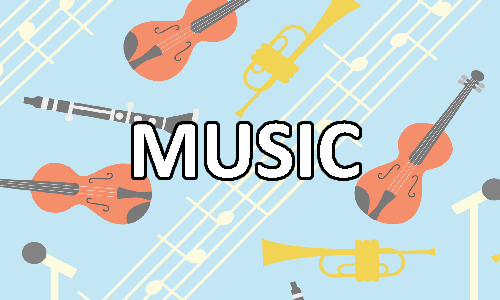Curriculum Intent - MusicMusic is a universal language, which here at Corbridge is all-inclusive, creative and bustling. We seek to inspire a love of music in all of our pupils, to ensure they have the understanding and musical knowledge to access, replicate and appreciate a wide range of musical genres, both individually and in groups, as well as expanding their understanding of culture and appreciation centred around being respectful learners. This in turn ensures they can be open-minded, confident and recognise that ‘creativity takes courage’.
|
In Music lessons, we endeavour to ensure that students are always engaged with the three core musical skills of composing, performance and listening and appraising. The curriculum is progressive and demanding, but allows our students to access music from different periods, to enable them to develop musical skills and teach them the knowledge which underpins the subject, to ensure not only are they well prepared for the next step in their musical education, but so that they are engaged, inspired and ask more questions about the world in which we live.
Not only will students demonstrate perseverance and resilience in approaching new and challenging theoretical devices, both in being able to identify these in the works of others, and to be able to apply these to their compositions. The National Curriculum states that a high-quality music education should engage and inspire pupils to develop a love of music and their talent as musicians, and so increase their self-confidence, creativity and sense of achievement. Whilst KS3 music at Corbridge prepares students excellently for the theoretical rigor of GCSE music, we recognise here that for many students promoting a desire to listen to music, and perhaps pursue performance in any range of ensembles is equally as important. In order to achieve this our music ensembles and performance opportunities are open to all. Our ensembles are fully funded through school and so engaging in extra curricular music has no limits.
We enrich Music here at Corbridge by offering opportunities for pupils to: perform in a year group concert; take part in a school production; speak about their musical preferences in assemblies; meet and listen to musicians, composers and music-industry specialists; take part in music competitions and festivals; join one of our many ensembles; listen for pleasure and compose for purpose.
I am passionate about Music and about the value it has in our pupils’ lives, therefore; we speak openly and honestly in class about preferences; we respect each other’s differences in discussion; we support each others weaknesses in practical tasks, yet take responsibility for our learning and our contributions.
Not only will students demonstrate perseverance and resilience in approaching new and challenging theoretical devices, both in being able to identify these in the works of others, and to be able to apply these to their compositions. The National Curriculum states that a high-quality music education should engage and inspire pupils to develop a love of music and their talent as musicians, and so increase their self-confidence, creativity and sense of achievement. Whilst KS3 music at Corbridge prepares students excellently for the theoretical rigor of GCSE music, we recognise here that for many students promoting a desire to listen to music, and perhaps pursue performance in any range of ensembles is equally as important. In order to achieve this our music ensembles and performance opportunities are open to all. Our ensembles are fully funded through school and so engaging in extra curricular music has no limits.
We enrich Music here at Corbridge by offering opportunities for pupils to: perform in a year group concert; take part in a school production; speak about their musical preferences in assemblies; meet and listen to musicians, composers and music-industry specialists; take part in music competitions and festivals; join one of our many ensembles; listen for pleasure and compose for purpose.
I am passionate about Music and about the value it has in our pupils’ lives, therefore; we speak openly and honestly in class about preferences; we respect each other’s differences in discussion; we support each others weaknesses in practical tasks, yet take responsibility for our learning and our contributions.



